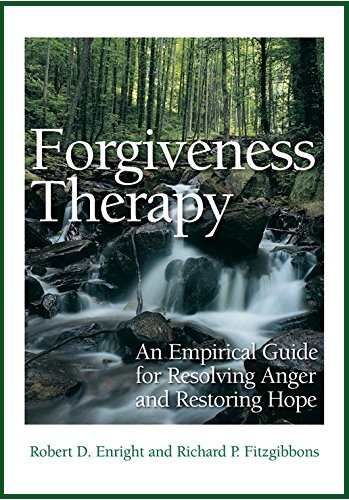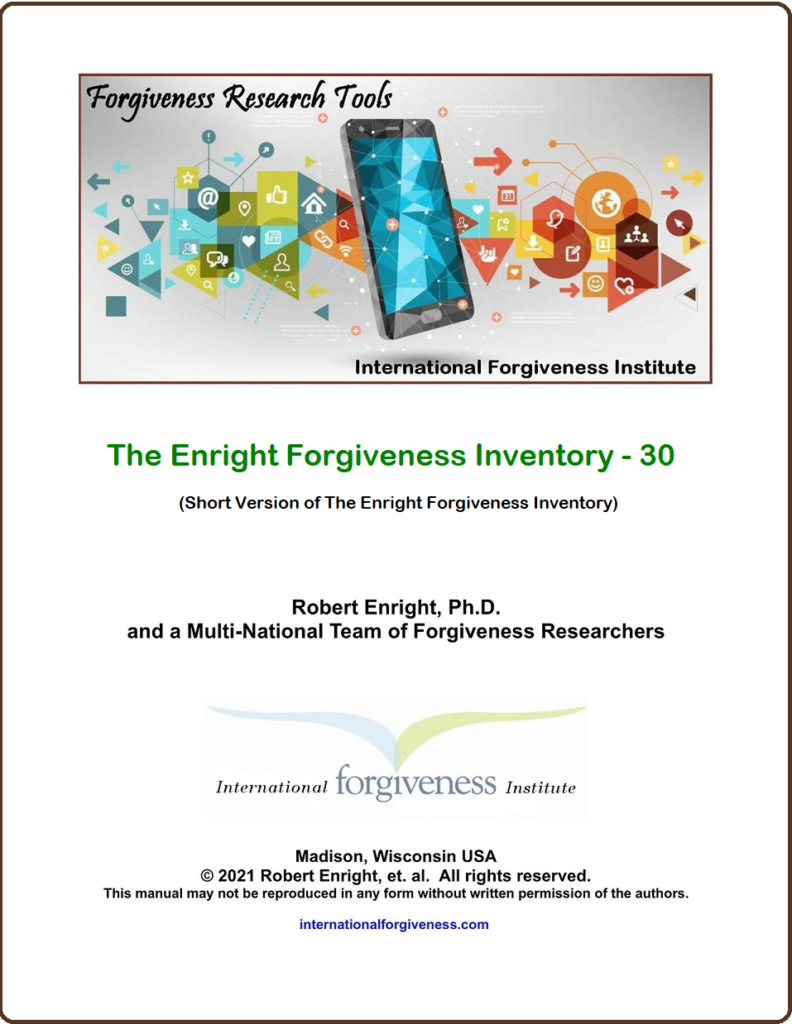Archive for July, 2021
Forgiveness Interventions Help Depressed Adolescents Cope and Thrive
Ample research has shown that depression is a significant and growing problem for today’s adolescents. Depression can impair a teenager’s cognitive functioning (i.e., thinking, reasoning, etc.), relationships with parents and peers, academic performance, and for cases of severe depression may even result in suicide attempts. Moreover, adolescent depression is also associated with poor outcomes in adulthood such as low-income levels, low educational aspirations, and high substance use.
Now, two international education and forgiveness specialists believe they may have uncovered one of the keys to reducing adolescent depression and major depressive disorder (MDD). According to the researchers, their first-of-its-kind study has shown that promoting social skills such as responsibility and self-control could be “particularly salient for the prevention of adolescent depression.”
The new study, A Longitudinal Analysis of Social Skills and Adolescent Depression: A Multivariate Latent Growth Approach, was published in the current issue of the International Journal of Psychological Research (the official publication of the Faculty of Psychology at San Buenaventura University in Medellin, Colombia.). The study authors included Dr. Zhuojun Yao, an educational psychologist and lecturer at Soochow (Suzhou) University in Suzhou, China, and Dr. Robert Enright, of our International Forgiveness Institute.
BACKGROUND: Adolescence is a period of increased vulnerability to depression because of complex changes in biology, cognition, and social domains. According to the 2019 National Survey on Drug Use and Health (NSDUH), 3.5 million adolescents aged 12 to 17 in the United States (14.4% of the total) had at least one Major Depressive Episode (MDE), and 70% of these adolescents had an MDE with severe impairment in 2018.
Most clinical depression among children starts in middle adolescence (ages 15-18) and is much higher for those in that age group than for those in early adolescence (ages 13-15). Although there are substantial empirical research studies demonstrating the association between social skills and adolescent depression, the authors of this study could not locate a single scientific work investigating how the change in social skills influences the change in depression from early to middle adolescence.
THE STUDY: To address this gap in fundamental knowledge, the researchers in this study questioned how changes in social skills (cooperation, assertion, responsibility, and self-control) influence changes in depression from early to middle adolescence. Using internationally respected measurement tools, the authors measured both social skills and depression in 1,064 participants (half boys, half girls). Those participants were drawn from a separate longevity study by the National Institute of Child Health and Human Development Study of Early Child Care and Youth Development (NICHD SECCYD) that ran from 1991 through 2008.
STUDY RESULTS: According to the study authors, adolescents who had more increase in responsibility and self-control from 5th grade to 9th grade tended to experience a slower increase in depression; while adolescents who had more reduction in cooperation and assertion from 5th grade to 9th grade tended to experience a faster increase in depression. Overall, the results suggest that responsibility in early adolescence may decrease adolescent depression by protecting adolescents from risk-taking and problematic behaviors in middle adolescence.
“When used in association with other therapeutic modalities. . .the psychotherapeutic
use of forgiveness can resolve the anger associated with depressive disorders.”
Dr. Robert Enright
IMPLICATIONS FOR FORGIVENESS: Interventions to reduce adolescent depression are becoming more important with each passing day because, as outlined above, adolescent depression also is associated with poor outcomes in adulthood. A 2009 study revealed that at least 27 million Americans take antidepressants, nearly double the number (13.3 million) who did so in the mid-1990s (Olfson & Marcus, 2009). Less understood is the fact that approximately 80% of adult mental disorders begin during childhood and adolescence (Kim-Cohen et al., 2003) and typically include an intense emotional state of anger.
 “Anger begins in early childhood and later extends to relationships with significant others, particularly those one wants to trust,” Dr. Enright writes in Forgiveness Therapy, the widely-heralded forgiveness intervention manual he authored with psychiatrist Dr. Richard Fitzgibbons. “Anger from childhood hurts and disappointments with parents and others can be unresolved and later misdirected unconsciously at others. [page 108]
“Anger begins in early childhood and later extends to relationships with significant others, particularly those one wants to trust,” Dr. Enright writes in Forgiveness Therapy, the widely-heralded forgiveness intervention manual he authored with psychiatrist Dr. Richard Fitzgibbons. “Anger from childhood hurts and disappointments with parents and others can be unresolved and later misdirected unconsciously at others. [page 108]
“Once anger develops, three options are available for addressing this powerful and complex emotion: denial, expression (active or passive-aggressive), and forgiveness. If the anger is resolved through a forgiveness process, it can facilitate the healing of the associated sadness, depression and the tendency to ruminate over past hurts.” [page 108]
According to Dr. Enright, “This study provides yet another compelling reason why we need Forgiveness Education in our schools NOW.”
This study on adolescent depression is just one of the many research projects undertaken by Drs. Zhuojun Yao and Robert Enright. Others include:
- The influence of moral stories on kindergarteners’ sharing behavior
- The role of consequences of moral action in maximizing moral elevation
- Belief in altruistic human nature and prosocial behavior: a serial mediation analysis
- The Link Between Social Interaction with Adults and Adolescent Conflict Coping Strategy in School Context
ENRIGHT FORGIVENESS INVENTORY, A STANDARD MEASUREMENT TOOL USED AROUND THE WORLD, NOW AVAILABLE IN SHORTER VERSION
An eight-nation study designed to test the applicability and sensitivity of the new short form of the Enright Forgiveness Inventory, the EFI-30, has demonstrated that the new instrument is a reliable and valid research tool that can be used across widely diverse cultures.
The Enright Forgiveness Inventory-30 (EFI-30) is a shorter version of the Enright Forgiveness Inventory for Adults (EFI) that was the first forgiveness measurement tool developed by Dr. Robert Enright and his Human Development Study Group at the University of Wisconsin-Madison. The EFI is an objective measure of the degree to which one person forgives another who has hurt him or her deeply and unfairly. 
After its development in 1995, the EFI quickly became a central component of forgiveness research both in the U.S. and internationally. It has been translated from English (original language) into Brazilian-Portuguese, Chinese, German, Hebrew, Korean, Dutch, and other languages. Its reliability and validity have been exhibited in Master’s theses, doctoral dissertations, and empirical articles published around the world.
The new study, Validating the Enright Forgiveness Inventory-30, was published this month in the European Journal of Psychological Assessment. It outlines the process and rationale used by the study’s authors to create a shorter version of the EFI (30 items instead of the original 60) that could convey the same meaningful information on the degree of interpersonal forgiveness across the domains of affect, behavior, and cognition. In other words, they developed a smaller, less time-consuming scale that is still accurate and reliable.
Data from the U.S. were used in the creation of the new measure and applied to seven other countries: Austria, Brazil, Israel, South Korea, Norway, Pakistan, and Taiwan. Results from the study provided the psychometric evidence for the reduced version of the EFI-30 across cultures. (NOTE: psychometrics is the branch of psychology that deals with the design, administration, and interpretation of quantitative tests for the measurement of psychological variables such as intelligence, aptitude, and personality traits.)
“While the EFI is particularly relevant when it accurately assesses people with low degrees of forgiveness,” Dr. Enright said in comparing the two research tools, “the EFI-30 has still demonstrated its effectiveness to distinguish particular cultural social norms that apply to the behavioral expression of forgiveness.”
According to Dr. Enright, the new EFI-30 tool is suitable to verify affective, behavioral, and cognitive changes in people who choose forgiveness for improvement of their well-being. He adds that it is designed to assess six psychological stances of victims toward offenders: positive affect, negative affect, positive behavior, negative behavior, positive cognition, and negative cognition.
The EFI-30 and other highly-regarded forgiveness research tools developed by Dr. Enright, co-founder of the International Forgiveness Institute (IFI), are now available absolutely free to any forgiveness researcher who requests them. To learn more about the tools, see the IFI website article Coveted Forgiveness Research Tools Now Available at No Cost. To request Research Tools for your own use, see Dr. Enright’s Forgiveness Research Tools.
New Study Shows Forgiveness Intervention can Improve Mental Health of Grieving Parents
In the first ever true experimental study of its kind, researchers have demonstrated the effectiveness of an educational forgiveness intervention on improving the mental health of parents grieving the loss of a child. The research was conceptualized and done by Lucia Záhorcová, a psychologist at Trnava University in Slovakia. The forgiveness intervention was developed by Dr. Robert Enright, co-founder of the International Forgiveness Institute, who also directed the study in the country that was once part of Czechoslovakia.
The pilot study results showed that participants in the experimental group (who received the forgiveness intervention), compared to those in the control group, achieved:
- Statistically greater improvement in forgiveness towards others and in self-forgiveness in both the post-test and the follow-up test conducted four months after the end of the intervention;
- A greater decrease in depression in both the post-test and follow-up test;
- A greater decrease in anxiety and anger in the post-test; and,
- Higher improvement in the post-traumatic growth in the follow-up test.
“The death of a child is a one of the most devastating and traumatic experiences a parent can endure,” according to Dr. Enright. “That’s why we wanted to determine if forgiveness could be a positive influence in reducing a parent’s depression, anxiety and anger just as it has been demonstrated in our studies with other clinical populations like incest survivors, emotionally-abused women, and post-abortion men.”
Dr. Enright said the study in Slovakia was the first ever forgiveness intervention with grieving parents in which a control group was used. It included 21 parents randomly assigned to the experimental group (in which the educational forgiveness intervention occurred) and 21 to the control group (in which a psycho-education grief intervention with a humanistic approach took place). All the parents were grieving the loss of a child older than three years of age.
“The study demonstrated that the forgiveness intervention definitely resulted in mental health improvements for parents grieving the loss of a child,” Dr. Enright stated. “The ability to forgive another person, perhaps even the murderer of their child, can positively influence the mental health of a bereaved parent.”
The Effectiveness of a Forgiveness Intervention on Mental Health in Bereaved Parents – a Pilot Study, was published on June 21, 2021, in OMEGA – Journal of Death and Dying. In addition to Dr. Enright (Dept. of Educational Psychology, University of Wisconsin-Madison) the study researchers included Lucia Záhorcová and Peter Halama, both in the Dept. of Psychology at Trnava University in Trnava, Slovakia. The three also teamed up for a 2019 study of 84 grieving parents called Forgiveness as a Factor of Adjustment in Bereaved Parents.
The Psychology of Interpersonal Forgiveness
By Suzanne Freedman, Ph.D.
Professor, University of Northern Iowa
I loved seeing the article on forgiveness in last month’s newsletter. I have discovered in my 30 years of studying forgiveness from a psychological perspective, that there are many misconceptions associated with what it means to forgive and contexts associated with forgiveness.
A common comment I hear from students in my university course on interpersonal forgiveness is that forgiveness is more complicated than people realize. It may not be the same notion of forgiveness preached by one’s parents or a religious leader. It goes beyond just saying the words, “I’m sorry” or “I forgive you.” Although we often ask for forgiveness for minor injuries, forgiveness occurs in the context of deep, personal and unfair hurt (Smedes, 1996, The Art of Forgiving).
Specifically, forgiveness involves a willingness to abandon one’s right to resentment, negative judgment, and negative behavior toward an offender, while fostering the undeserved qualities of compassion, empathy, and goodwill toward one’s offender (Enright, 2001, Forgiveness is a Choice). Notice that in this definition, one has a right to resentment and that the offender does not deserve one’s compassion and goodwill.
Although frequently confused with forgetting, acceptance, condoning, excusing, pardon, and denial of anger, forgiveness is none of these. When we forgive, we decrease our negative thoughts, feelings, and behaviors toward the offender and over time, increase our positive thoughts, feelings, and sometimes behaviors toward the offender. We can also only forgive for the way that we were personally impacted by an offense.
Another common misconception about forgiveness is that you cannot forgive unless you receive an apology from the offender. This may be true for reconciliation but not forgiveness. Forgiveness is something people can do all on their own, for their own well-being, without any response from the offender. Forgiveness can sometimes lead to reconciliation between the injured party and the offender, but it does not have to.
I began my career by educating adult incest survivors about forgiveness, and have recently turned my attention to children and adolescents. By teaching students about the psychological process of forgiveness, we are helping them develop healthy ways to express feelings, understand the perspective of others, and practice empathy and kindness.
As summarized by a 5th grader who was part of a forgiveness education program that I taught:
“I’ve learned that anger is a natural feeling. It takes time to forgive. You don’t have to forgive right away. They don’t always apologize. Forgiveness is one step closer to healing. You don’t have to be friends with the offender after. Apologies make forgiving easier. Forgiveness is made by the person who was hurt. If you want revenge, then you haven’t forgiven in your heart.”
I am often asked “Why forgive?” and my response is always the same: “What’s the alternative?” Although forgiveness cannot undo the injury, or damage caused by the injury, it allows us to move forward in our lives free from the negative effects of all-consuming anger, hatred, and resentment. It offers us a way to heal while still acknowledging that what happened to us was wrong, unfair, and extremely hurtful.
This article originally appeared in the June 2021 issue of SEL in Action, “a newsletter written for educators, by educators to share real world stories, questions, ideas and opinions about how to address the social and emotional needs of students and the adults who teach them.” Social-emotional learning (SEL) is the process of developing the self-awareness, self-control, and interpersonal skills that are vital for school, work, and life success.

Dr. Suzanne Freedman
Dr. Suzanne Freedman is the author of The Courage to Forgive: Educating Elementary School Children About Forgiveness, a curriculum guide for 4th and 5th grade students she co-authored with Dr. Robert Enright.
Dr. Freedman was recognized with a Veridian Community Engagement Fellowship (Fall 2020) for “meeting a community need through teaching and/or scholarship.” That same year she was also awarded a Kern Family Foundation Grant for a project that “examined ways that moral virtues, such as empathy, can be infused into a course on child and adolescent development.“
Learn more about Dr. Freedman and her work at the University of Northern Iowa.



